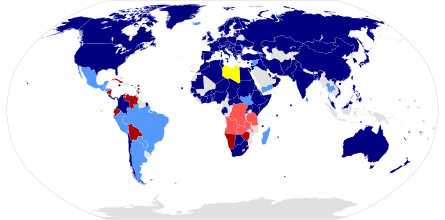International recognition of the National Transitional Council
By 2012, 104 United Nations members and two observer states had announced they recognised the NTC as the legitimate representative of the Libyan people, and some of them had indicated that they were recognising the NTC as the only legitimate representative of the Libyan people, severing diplomatic relations with Gaddafi's government in the process.
The European Union and several individual countries, such as Switzerland, established a diplomatic presence in Benghazi, the former de facto headquarters of the council and the continuing location for many of its offices.
[2][3] On 20 September 2011, the African Union officially recognised the National Transitional Council as the legitimate representative of Libya.
[13] On 19 July, after sending a message to Gaddafi that there would be no negotiation and that he must step down, the US began to urge other countries to recognise the NTC.
[3] Several international organisations formed a relationship with the National Transitional Council in Benghazi, and the NTC was formally accredited as Libya's legitimate representative by some of them.

